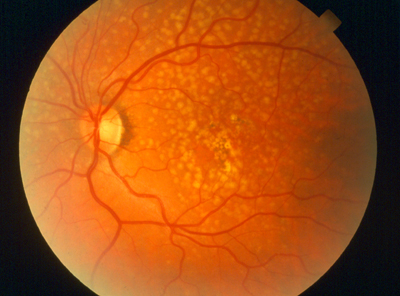Macular Degeneration
Chicago, Illinois
Macular degeneration, also known as Age Related or Senile Macular Degeneration or ARMD, AMD or SMD is a disorder of the area of the retina called the fovea or macula used when you are looking at something or someone. The retina is like the film in the camera and the macula is the portion of the retina that is used for best vision. When you are looking directly at something and want to see fine detail, you are using your macula. Light hits the retina and sends impulses to the optic nerve. The optic nerve then acts as the telephone connection between the eye and the brain. Macular degeneration most commonly progresses slowly so that people may not notice any change in their vision. In those with Wet Macular Degeneration the changes can occur very quickly and may lead to a loss of central vision if not treated. Macular degeneration is the most common cause of irreversible vision loss in those over 60 years of age. There are two main forms of macular degeneration are the dry and the wet form.
 Dry Macular Degeneration
Dry Macular Degeneration
Dry macular degeneration occurs when the retinal cells of the macula die leading to blurring of central vision. As dry macular degeneration gets worsens, some may lose their central vision, but maintain their vision in the periphery. Most commonly, people notice slightly blurry vision with difficulty recognizing faces or reading. Some may compensate by using a brighter light when reading or trying to perform fine tasks. Dry AMD can affect either eye or both. It is quite possible to have good vision in one eye while having poor central vision in their other eye.
On examination, the most common early signs of dry macular degeneration are drusen and retinal pigment epithelial changes. Drusen come in many varieties but most are a yellowish color and are formed from retinal cells and may be associated with retinal pigment epithelial change seen as brown or black specks on the retina. They are often found in people over age 60 and are seen and followed during a comprehensive dilated eye exam. When seen at Golden Eye Surgeons and Consultants, we take high resolution digital photographs and can show you the findings in your eyes. Dry macular degeneration has three stages -- early, intermediate, and advanced and may occur in one or both eyes.
People with early changes of macular degeneration may have little or no vision loss. People with intermediate changes have more significant retinal changes and can have blurred vision centrally. More light or a hand-magnifier may help you with reading and other fine tasks. People with advanced dry AMD have a significant loss of retinal photoreceptors in the macular region. This at its worst, can lead to a loss of central vision that may cause the inability to read or recognize faces until they are very close to you. Even with a loss of central vision, most people still maintain good peripheral vision.
If you have macular degeneration in only one eye, you may not notice any changes in your vision. Your other eye may allow you to see clearly, drive, read, and see fine details. If you experience blurry vision, you should call us to schedule a comprehensive examination including dilation and digital imaging..
Wet Macular Degeneration
Wet macular degeneration is very different than dry macular degeneration. Unlike the slow changes in the dry form, in wet macular degeneration blood vessels grow under the retina. These blood vessels are fragile and leak blood and fluid and then lead to swelling of the macula with resultant decreases in vision. If you notice that lines that were previously appeared straight seem curved this may mean that there has been a recent growth of blood vessels that needs immediate treatment. If you become aware of this condition or other changes to your vision, contact our office immediately as you will need a complete dilated eye exam. With wet macular degeneration, loss of central vision can occur very quickly without treatment. Treatment these days may allow for excellent vision depending upon how quickly this is caught and treated.




